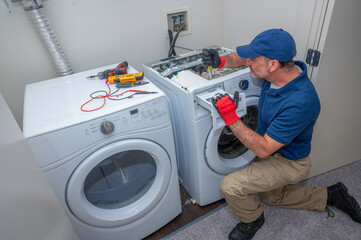Household appliances are the unsung heroes of daily life. They wash our clothes, keep our food fresh, brew our morning coffee, and make countless tasks easier and faster. Yet, like any hard-working tool, appliances can wear down, malfunction, or stop working entirely. Understanding the basics of appliance repair and how to maintain these essential machines can save time, money, and frustration while keeping your household running smoothly.

The Importance of Timely Repairs
When an appliance starts acting up—whether it’s a strange noise, a leak, or a sudden loss of power—it’s tempting to ignore the problem and hope it resolves itself. In most cases, though, minor issues only get worse with time. A small leak in a washing machine can lead to floor damage, while an inefficient refrigerator can increase energy bills. Prompt attention prevents minor malfunctions from becoming major breakdowns, extending the life of the appliance and maintaining its performance.
Common Household Appliances and Their Issues
Different appliances have different weak points, but many share common problems:
- Refrigerators and freezers may develop faulty thermostats, worn door seals, or clogged drain lines, leading to inconsistent temperatures or frost buildup.
- Ovens and stoves can experience heating element failures, temperature inaccuracies, or control panel malfunctions.
- Dishwashers often struggle with clogged spray arms, worn gaskets, or faulty pumps that reduce cleaning efficiency.
- Washing machines and dryers may develop unbalanced drums, broken belts, or worn bearings, leading to noisy operation or poor performance.
Recognizing these issues early gives you the chance to call for service or attempt basic troubleshooting before a full replacement is necessary.
The Benefits of Professional Expertise
While some minor maintenance tasks can be done by homeowners—like cleaning filters or replacing a worn hose—many repairs require specialized skills, tools, and safety precautions. Professional appliance repair technicians are trained to diagnose problems accurately, source the correct replacement parts, and ensure that repairs comply with safety standards.
Hiring an expert also helps preserve warranties. Many manufacturers stipulate that authorized professionals must handle repairs to keep warranties valid. Attempting complex DIY fixes could void coverage and lead to more costly problems later.
Preventive Maintenance Tips
Preventive care can dramatically reduce the likelihood of breakdowns:
- Clean filters and vents regularly. Clogged filters in dryers, dishwashers, or air conditioners restrict airflow and strain the system.
- Check seals and gaskets. Worn door seals on refrigerators or ovens can let air escape, forcing the appliance to work harder and reducing efficiency.
- Avoid overloading. Overstuffing washing machines or dishwashers puts stress on motors and moving parts, leading to premature wear.
- Use appliances as intended. Follow the manufacturer’s guidelines for loading, settings, and maintenance schedules to avoid unnecessary strain.
These simple habits prolong the life of your appliances and ensure they operate at peak performance.
Energy Efficiency and Savings
Well-maintained appliances don’t just work better—they use less energy. A refrigerator with clean coils and intact seals cools food more efficiently, while a dryer with a clear vent line dries clothes faster. Lower energy use translates into savings on utility bills and reduces your household’s environmental footprint.
Upgrading certain components during repairs, such as installing energy-efficient parts, can also enhance performance. Discussing these options with a professional technician can help you make cost-effective choices.
Safety First
Appliances combine electricity, water, heat, and moving parts—factors that can be hazardous when mishandled. Before attempting any troubleshooting, unplug the appliance or switch off its circuit breaker. If the problem involves wiring, gas connections, or complex mechanical systems, it’s best to leave the work to a qualified professional.
Even routine maintenance requires caution. For example, when cleaning refrigerator coils or dryer vents, use the proper tools to avoid damaging components. Safety should always be the priority.
Deciding Between Repair and Replacement
Sometimes, repairing an older appliance may not be the most economical choice. Factors to consider include the age of the appliance, the cost of repairs, and its energy efficiency. As a rule of thumb, if a repair costs more than half the price of a new appliance—and the unit is near the end of its expected lifespan—replacement may be the better option.
However, many appliances fail due to simple, inexpensive issues like worn belts, faulty switches, or clogged filters. A professional diagnosis can help you make an informed decision and avoid unnecessary spending.
Preparing for a Service Visit
If you’re scheduling a repair appointment, a little preparation can speed up the process:
- Take note of the appliance’s model and serial number.
- Write down the symptoms or error codes you’ve noticed.
- Clear the area around the appliance for easy access.
- Have any relevant paperwork, such as warranty details, on hand.
Providing this information allows the technician to bring the right tools and parts, reducing downtime and return visits.
Keeping Track of Maintenance
A simple maintenance log can help you stay organized. Record when filters were cleaned, seals replaced, or professional inspections performed. This record not only keeps appliances running smoothly but also provides useful information if you decide to sell your home, as well-maintained appliances can be a selling point.
The Long-Term Payoff
Investing in appliance repair and maintenance pays off in multiple ways. You save money by avoiding premature replacements, reduce energy costs through improved efficiency, and enjoy the convenience of reliable machines that simplify daily life. More importantly, you gain peace of mind knowing your appliances are safe and well cared for.
Household appliances may seem like everyday conveniences, but they’re also valuable assets that deserve proper attention. Prompt repairs, regular maintenance, and professional expertise ensure these hardworking machines continue to serve you for years to come. By understanding the basics of appliance repair and making proactive choices, you can protect your investment, save money, and keep your home running smoothly without unnecessary stress.
